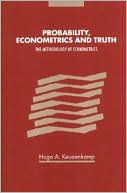

 |

|

The average rating for Probability, Econometrics and Truth: The Methodology of Econometrics based on 2 reviews is 4.5 stars.
Review # 1 was written on 2020-11-02 00:00:00 Tracey Savage Tracey Savagethe publisher's blurb When John Maynard Keynes likened Jan Tinbergen's early work in econometrics to black magic and alchemy, he was expressing a widely held view of a new discipline. However, even after half a century of practical work and theorizing by some of the most accomplished social scientists, Keynes' comments are still repeated today. This book assesses the foundations and development of econometrics and sets out a basis for the reconstruction of the foundations of econometric inference by examining the various interpretations of probability theory that underlie econometrics. --- This book provides valuable discussions of central philosophical topics, e.g. induction, causation, simplicity, definitions of probability, alternative approaches to statistical inference, etc. with many references to the works of leading authorities in many fields. Then this important material, which is woefully lacking in econometrics texts, is related to past and current econometric research in a penetrating manner. Keuzenkampf is to be congratulated for providing us with a well-written, knowledgeable and illuminating discussion of fundamental issues. His book will be of great interest not only to econometricians but also to anyone interested in the foundations of statistics and its uses in economics and other sciences. Arnold Zellner, Professor Emeritus of Economics and Statistics, The University of Chicago --- The author displays a terrific command over a wide range of literature in the philosophy of science, probability theory, statistical inference, and econometrics. There is no question that his scholarship is deep, and that the book is a useful reference. Its critique of Popperian falsificationism is especially sharp. A.J. Sutter --- The Best Book Written On Econometrics, Philosophy, and Keynes This book is already a classic. Keuzenkamp blends the philosophy and history of probability and statistics with that of econometrics in such a skillful fashion that the technically trained reader (upper division courses in mathematical statistics, probability, econometrics and philosophy) will want to start reading it over again as soon as he finishs the book the first time. Keuzenkamp correctly realizes that the goal of econometrics can only be that of estimating and not testing. Keuzenkamp correctly shows that econometrics should be founded in the positivist (logical empiricist) tradition. Finally, an academic economist gives J M Keynes's arguments, made by Keynes in his debate with Tinbergen over the ability of econometricians to Test (with a capital T as in Truth) different theories of the business cycle, their just due. There is only one small (very small) quibble. On pages 272-273, Keuzenkamp states: "Furthermore, an investigator may try different prior distributions in order to obtain upper and lower limits in probabilistic inference (this approach is proposed by Good and Leamer)". In fact,J M Keynes was the first advocate of this approach in Part V of A Treatise on Probability. The interested reader can find Keynes's interval approach in chapters 5, 10, 15, 16, 17, 20, 22, 29 and 30. Keuzenkamp has destroyed the myth, created by many philosophically illiterate economists and econometricians over the last 60-65 years, that Keynes's knowledge about mathematics and statistics was "rusty" and that he was just trying to shoot the sound ideas of other researchers "full of holes" because he didn't understand what they were doing. Keynes understood only too well. Michael Emmett Brady --- [found in the following list] Books with the best decision theoretic and philosophical foundation by Michael Emmett Brady The following books will provide an optimal understanding of how one should study and organize the data and observations that comprise the social sciences. These books provide a broad foundation in logical, epistemological, and philosophical techniques that are sound and valid. A reader who masters these books will quickly grasp the complex, dynamic, nonlinear aspects of social science systems as they evolve through time. 1. The General Theory of Employment, Interest, and Money - John Maynard Keynes 2. A Treatise on Probability - John Maynard Keynes 3. Risk, Uncertainty and Profit - Frank H. Knight 4. The Theory of Economic Development - Joseph A. Schumpter 5. The Wealth of Nations - Adam Smith 6. Risk, Ambiguity and Decision - Daniel Ellsberg 7. The (Mis)behavior of Markets - Beniot Mandelbrot and Richard L. Hudson 8. Probability, Econometrics and Truth - Hugo A. Keuzenkamp 9. The Unbround Prometheus: Technological Change and the Industrial Development in Western Europe from 1750 to the Present - Second Edition - David S. Landes 10. The Laws of Thought - George Boole 11. The Black Swan - Nassim Nicholas Taleb 12. Fooled by Randomness - Nassim Nicholas Taleb 13. J.M. Keynes Theory of Decision Making, Induction and Analogy - Michael Emmett Brady |
Review # 2 was written on 2015-01-19 00:00:00 Thomas Billinge Thomas BillingeComprehensive and easy to digest review of statistical analysis techniques with specific examples geared towards economics. |
CAN'T FIND WHAT YOU'RE LOOKING FOR? CLICK HERE!!!